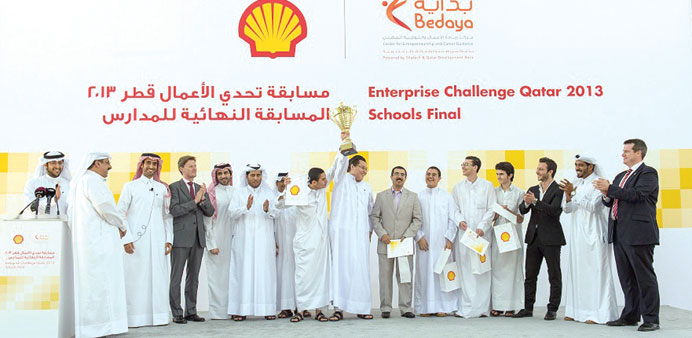Bedaya Centre and Qatar Shell are targeting around 700 students from nine universities and 12 schools in Qatar for the Enterprise Challenge Qatar (ECQ) Programme, scheduled to begin next month.
Following the success of the 2013 ECQ Programme, Bedaya Centre had signed a three-year Memorandum of Understanding with Qatar Shell, to expand the programme among universities and schools in Qatar.
“The future of Qatar is enterprise, so we are delighted to expand the partnership with Qatar Shell on ‘The Enterprise Challenge Qatar’ initiative, following our success in previous years,” said Raed al-Emadi, vice-chairman of Bedaya Centre.
“Through promoting entrepreneurship as a viable alternative among young people in Qatar, the competition aims to support a thriving private sector,” he explained.
The ECQ is a unique annual competition that aims to teach university and school students about setting up and running a business using a business simulation game.
The students who participate benefit from bring mentored by experienced business professionals who give them the benefit of their extensive business experience.
Mentors for this year’s programme have been trained during May and June with their last training sessions being delivered this month.
The ECQ competition involves a series of intensive mentoring sessions and workshops provided by around 100 volunteer mentors, many of which are Qataris trained by Bedaya and Qatar Shell.
The competition, which starts in September and runs until November for universities and to December for schools, with semi-finals taking place a month before the finals for each group. Schools and universities enter teams of three to five students.
Winners of the universities finals will be announced during the Global Entrepreneurship Week (November 17-23), followed by the schools finals in December.
Initially the competition has two key elements with students receiving mentoring on ethical and responsible business and business simulation. The latter teaches students’ key business principles as teams play an online business simulation game to produce, market and sell one of five products. Students learn the entire gambit of how to run a business from inception to implementation, finance considerations, sales, marketing and production.
The next stage runs from mid to end of October for universities and from mid to end of November for schools after which the teams’ performance is assessed to identify the highest scores.
The last stage comprises the grand finals, when the finalist teams in both universities and schools play the online simulation game once more with teams recording the day’s highest score declared winners. Teams compete in a set of tasks and the overall winners are pronounced national champions.
The Enterprise Challenge attracts experienced mentors who volunteer from a range of professional backgrounds – either business managers or executives from professional services firms, leading banks or law firms.
Mentors support teams of three to five students across six one-hour mentoring sessions. Typically they will attend evening training sessions, planning and mentoring sessions and impart their wisdom on business aspects.
Since the ECQ was launched in 2012 it has rapidly expanded with more institutions, businesses, schools and mentors getting involved.
The ECQ was created by Mosaic, a UK-based not for profit organisation established by the Prince of Wales in 2007 as part of The Princes Trust, which offers mentoring programmes to advance business opportunities for young people.
Mosaic provides comprehensive training for ECQ teachers and mentors which outlines the tasks, responsibilities and practical activities their role entails, as well as the skills they need to impart to mentor the students.

